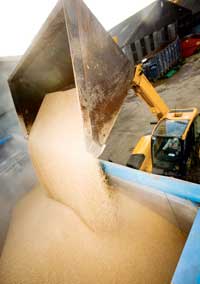Avoid the grain contract pitfalls

Volatile commodity markets are fertile ground for contract disputes. Chartered arbitrator Peter Brown explains some of the common problem areas
A contract is an agreement between two parties, for example to sell and buy a stated quantity of grain at a given price, quality and delivery period.
That agreement, however and wherever it is reached, does not have to be in writing, although inevitably the buyer will issue written confirmation.
The seller should always immediately check the confirmation is correct in every detail. If it does not reflect the agreement, the buyer should be told immediately and perhaps the seller should not part with the goods until the matter has been remedied and a corrected confirmation issued.
It is a myth that the confirmation has to be signed to make it binding. Nor is there any period of reflection – a contract is a contract and it has to be performed.
The main UK grain traders issue their company terms and conditions annually. The mainstay of these is the Agricultural Industries Confederation No 1/10 grain contract terms. Every grain seller should have a copy (2010 version) and understand the main clauses and how to apply them.
That contract is not, as commonly believed, a buyer’s tool. A seller may impose his own provisions, provided the buyer accepts them. That contract also specifies the rights and obligations of the parties if things go wrong. The HGCA seller’s checklist provides advice on how to avoid common problems.
However, buyers sometimes vary the terms of the AIC No 1/10, typically concerning tonnage tolerances and quality claims, so it is important to check contracts for any changes.
Sellers who have been overtaken by a steeply rising market sometimes try to claim force majeure (AIC contract cl.21), for example, “I didn’t get the crop which I expected so you cannot have all the goods which you bought.”
There is no such defence in force majeure, which simply covers an unexpected event like a breakdown of plant or machinery, power failure, fire or flood, which in turn prevents either party from performing the contract in the short term.
Force majeure provides a breathing space of 30 days for the problem to be remedied so the contract may be performed on the original terms.
Sellers should also be aware that under the terms of AIC No 1/10, they are selling goods “not necessarily being the sellers’ own produce'”, so if selling forward and grain of sufficient quantity and/or quality is not produced, the buyer may buy-in grain of that quantity and quality and charge the seller for damages arising from that replacement purchase.
Sellers should also be familiar with AIC contract clause six, dealing with tolerances and providing for delivery of plus or minus five tonnes or 15%, whichever is the lesser quantity, of the contractual quantity. Any damages are calculated on the mean contractual quantity, not after deduction of any tolerance. However, if the sale figure is for example 180-200t, there is no tolerance applied, because the seller’s obligation is to deliver a quantity between those two figures.
A seller should try to arrange with the buyer that any allowance sought for non-contractual quality on arrival at a delivery point is to be made known before the load is tipped. If the vehicle is at a destination within reasonable distance, the seller should be allowed to attend a second sampling and analysis. That second test result, or an average of the two tests, could make the load suitable for acceptance at the contract price.
If a seller knows he is short of quantity he should tell the buyer before the time of delivery so the buyer may, with the seller’s agreement, replace the likely shortfall and minimise any costs. The buyer is obliged to minimise the seller’s losses. Alternatively the seller can make good the shortfall himself.
If goods are supplied during the contractual period and a shortfall only then becomes obvious, the default date is the first business day after the contract period. Any damages must be established on the default date or very shortly afterwards.
A claim for damages can be deducted from the value of grain already delivered on the same contract. However where no deliveries have been made, the usual practise is that the buyer will invoice the damages (ie the cost of buying in against the seller) and require payment to be made within seven days.
If that payment is not made in time the buyer is likely to issue a claim for damages to be decided by arbitration.
• For cereal selling advice, see the Harvest Toolkit at www.hgca.com. Peter Brown is based in Suffolk and can be contacted at pb@disputeresolve.co.uk, telephone 01728 454 034

